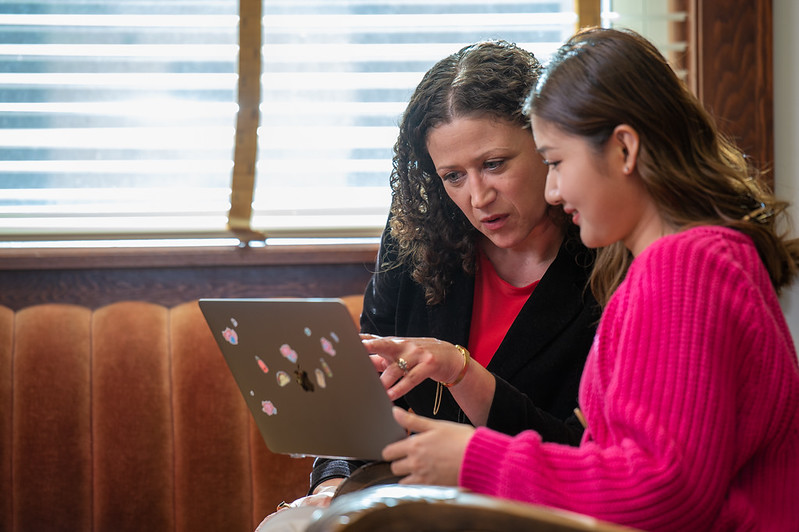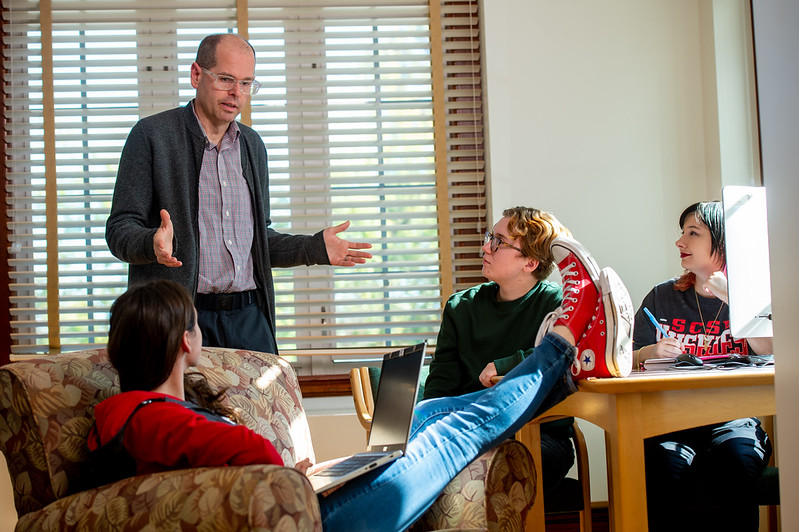
Jennifer Cavalli had a unique view on Honors when she interviewed to be the Executive Director of the newly-established Honors College at St. Cloud State.
“Honors is for everyone: it’s about motivation, drive and dedication,” Cavalli said. “Past academic performance is not the most important thing. Engagement with one’s community, the motivation to take risks with learning … that type of intellectual curiosity carries a lot more weight.”
That viewpoint, combined with the support from Deeann Griebel ’76, serves as a foundation for reimagining what Honors looks like at SCSU. Griebel, an alumna of SCSU’s previous Honors program, made a gift to SCSU to support the University’s strategic initiatives within the It’s Time framework. Her gift was used to assist in transforming the program into a robust Honors College.
It was the idea of building something new that first drew Cavalli to St. Cloud.
“What a unique and rare and exciting opportunity to build from the ground up,” she said about the opportunity. “I’d been reworking and redesigning programs … the thought of not having to deconstruct first was a big draw for me.”
Cavalli was first introduced to Honors at Pacific Lutheran University, serving as a faculty fellow in their International Honors Program. She also worked with resident assistants in the living learning community and taught first year experiences.
Cavalli later moved on to teach in the History Department at the College of Charleston in 2016, where she began working within Honors straight away. College of Charleston had a more established Honors College than she had previously been exposed to, and Cavalli found herself and her students got the most out of her Honors-focused classes.
“It really made me a convert to thinking about a different approach to classroom learning,” Cavalli said. “I found my professional voice really fit that smaller seminar style. We were able to do some really amazing things with the curriculum, and the last three years (there) I moved into an administrative role in student engagement.”
Those experiences prepared her for the big challenge facing her new role at SCSU: how do you move from an Honors program that only served part of a student lifecycle to envisioning what an Honors college looks like for the full lifespan of a student?
Cultural Shift
Creating such a significant shift is no easy task. But Cavalli’s background as a first-generation transfer student makes her aware of how essential it is to create a community that can accommodate students from different backgrounds.
“Honors colleges can’t take themselves too seriously; the most important key to being successful is to see itself as partners and helpers to faculty, staff and especially students.”
This mindset allows faculty to explore and experience new things, serving as an incubator for discovering new ideas. One example is Honors piloting a few AI-focused courses next year to create an exploratory space for learning.
“We have so many gifted, talented faculty that aren’t only interested in what they do, but they also are interested in students and learning more,” Cavalli said. “Honors can and should be the place for that.”
It’s essential to think that way in an era when the landscape of higher education is constantly shifting.
When a curriculum speaks to all the different stages of a student’s learning cycle, it lets them explore further and deepen their learning in subjects that matter to them.
“Honors colleges really are about the mentoring we give to students; it’s where we reframe the specialized learning they do in their majors,” Cavalli said. “How do they think about it and communicate details to audiences that aren’t specialized? That’s a professional, transferable skill.”
The idea that Honors courses are more challenging is a common myth that Cavalli is eager to dismiss.
The courses aren’t inherently more difficult or require extra coursework, but they instead rely on an interdisciplinary approach that can benefit students for the future.
“We have so many talented students who just need the extra resources or extra attention … it’s amazing what people can do when they feel someone has invested in them,” Cavalli said.

Forming Community
Professor Jason Lindsey focuses on political theory, specializing in politics of Russia and the Soviet Union while teaching at SCSU the past two decades.
In Fall 2022 he added a new title: Honors College Faculty Fellow.
As a faculty fellow, Lindsey is reassigned part of his time to teach in the Honors College and be on a committee that works on the college’s curriculum. Lindsey is serving a three-year term and hopes as the college grows there will be more faculty fellows from a wide range of units and departments across campus.
Lindsey was an undergraduate at the University of Alabama when he was first introduced to an Honors program at the collegiate level. At a large school of over 30,000 students, it was his path to building a sense of community.
“The Honors program became my home; I met people in the first-year Honors classes that I would see in my senior year,” Lindsey said. “It was where I connected with a lot of people.”
SCSU is trying to replicate that feeling with their cohorts of students and the Honors Living Learning Community, and Lindsey hopes these strides can create a more well-defined community on campus to serve Honors students. This could better support students from their first year all the way to graduation.
“Those students on campus tend to become the nucleus for other things happening; Honors students tend to be some of the most active and engaged,” he said. “We’re hoping that connects to other organizations and groups on campus.”
“It extends beyond residential students to be a place where our commuter students and transfer students feel they have a space they belong,” Honors College Executive Director Jennifer Cavalli added.
Honors focuses on connecting with different majors and students across campus, including a focus on interdisciplinary approaches in the introductory course Honors 101. Whatever field of study a student pursues, this helps them think about how their field connects with others down the road.
The new curriculum also includes a student completing a final project to set them ahead in their careers post-graduation.
“We want there to be some final experience or product that they develop in their major, and that gives them an initial product in their portfolio coming out of their undergraduate years,” Lindsey said.
A more inclusive vision of the Honors College also caters to transfer students and non-traditional students at SCSU.
“We’re hoping they’ll have more of a connection to St. Cloud State as an alumnus when they finish,” Lindsey said about students’ experiences. “We hope students will go out in the community and talk about what they got from it.”
Positive Future
Eryn Bloom is one of those students already spreading the word on what benefits Honors can provide.
Bloom is from the St. Cloud area and is a third-year student double majoring in hydrology and earth sciences. She entered the Honors program right out of high school, introduced to it at orientation in August of 2021.
“They described it for driven students; if you’re someone who wants to take advantage of opportunities, this is a good way to get started,” Bloom said.
Bloom stayed in the Honors Living Learning Community her freshman year, growing close with her fellow hallmates. Having that friendship and Honors academic support were huge aids in helping guide her through the start of her college experience.
She now serves in a new role as an Honors ambassador, helping with recruitment at events, giving tours and answering questions. One of her main initiatives is programming events for the Honors Club and working to start a competitive trivia team.
Bloom works in Case-Hill Hall as an undergraduate assistant director, and she noted other ambassadors are also very involved on campus.
“I see (Honors) becoming a community where people know it’s a good way to get involved on campus and it’s an in for opportunities,” Bloom said. “I’m excited to see what comes out of student research initiatives and community involvement. We want the meaning of the Honors College here not to just be the smartest students but the most thoughtful, most dedicated and most involved in the community.”
A successful Honors college includes community partnerships and support. Honors worked with TRIO, Multicultural Student Services and the Career Center to put on an enrichment series last fall. Support from Griebel made these program enhancements possible, including the continuation of an annual trip to allow first-year students opportunities to explore Minnesota, which started in 2021 through her encouragement and support. Other opportunities included working in the SCSU Community Garden and visiting St. Cloud’s Munsinger Gardens.
The Honors College provides academic and social support, including a student success coach housed in the Honors College to work with students throughout their entire college journey.
Bloom found it valuable to move with the same core of students through classes. While Honors used to be mainly focused on freshman transition, the new vision includes customizable aspects throughout the entire college experience.
Students entering the newly-established college are only one year into their journey, but early signs of progress are evident.
While Bloom already completed the former version of the program and won’t graduate until 2026, she sees a bright future ahead for the Honors College.
“There’s solid leadership over there that have great minds and visions,” she said. “Dr. Cavalli got here only (last summer), and she’s already done so much. This amount of change in such a short amount of time makes me feel so positive. Everything they want to see implemented will happen.”
